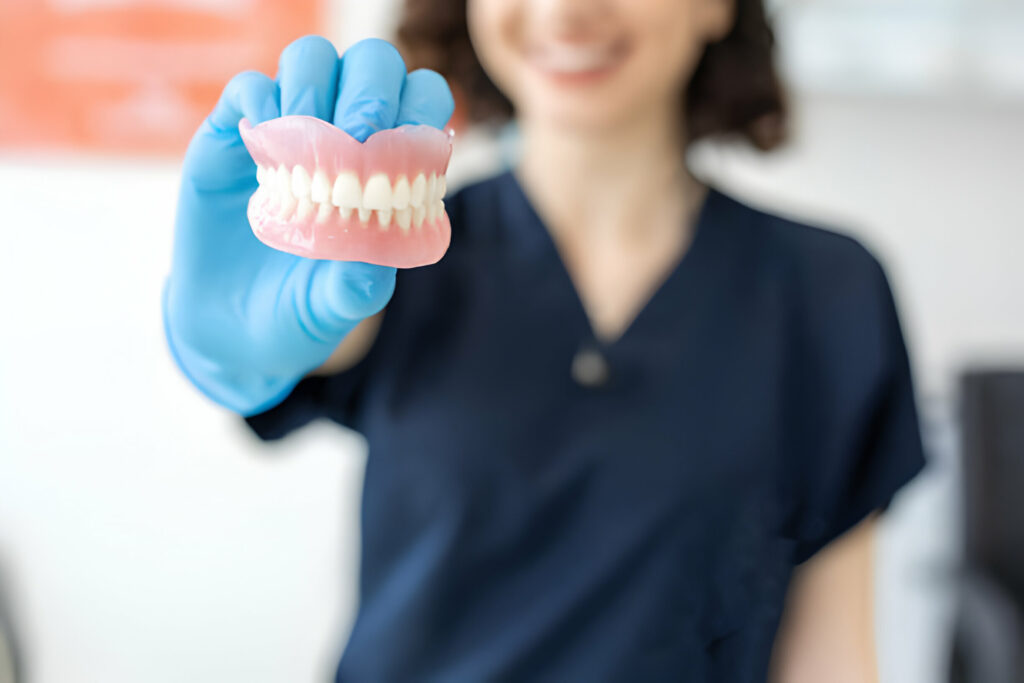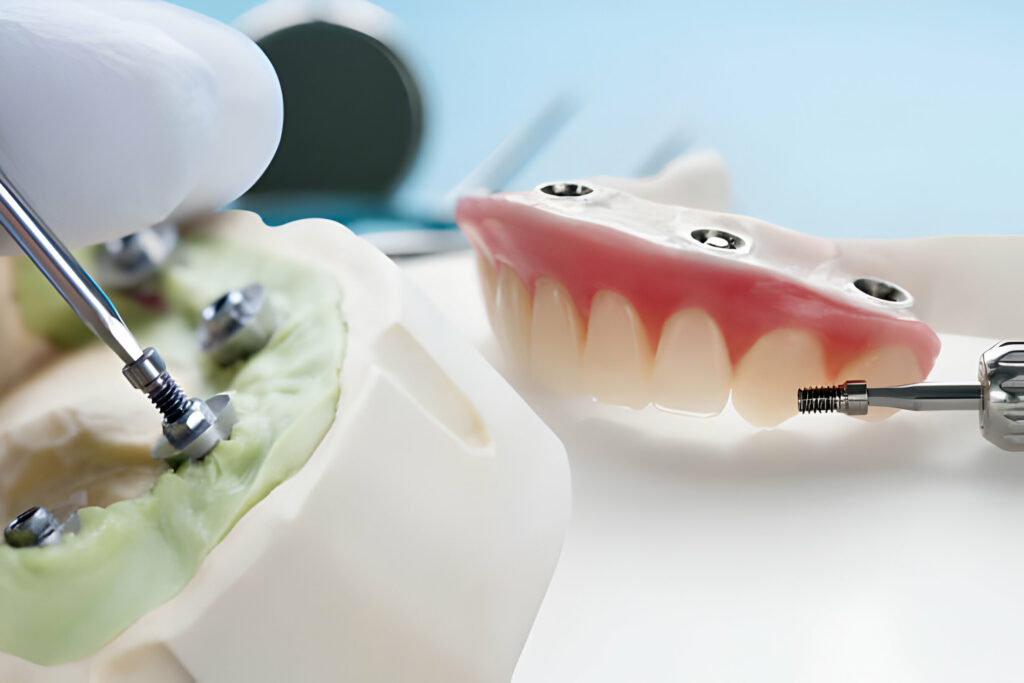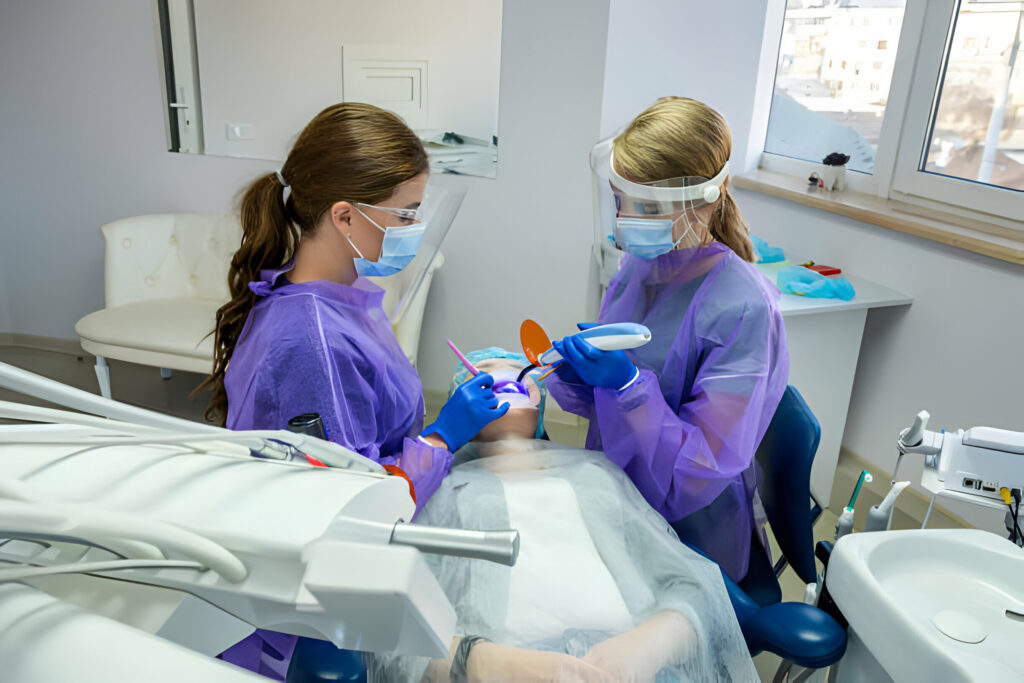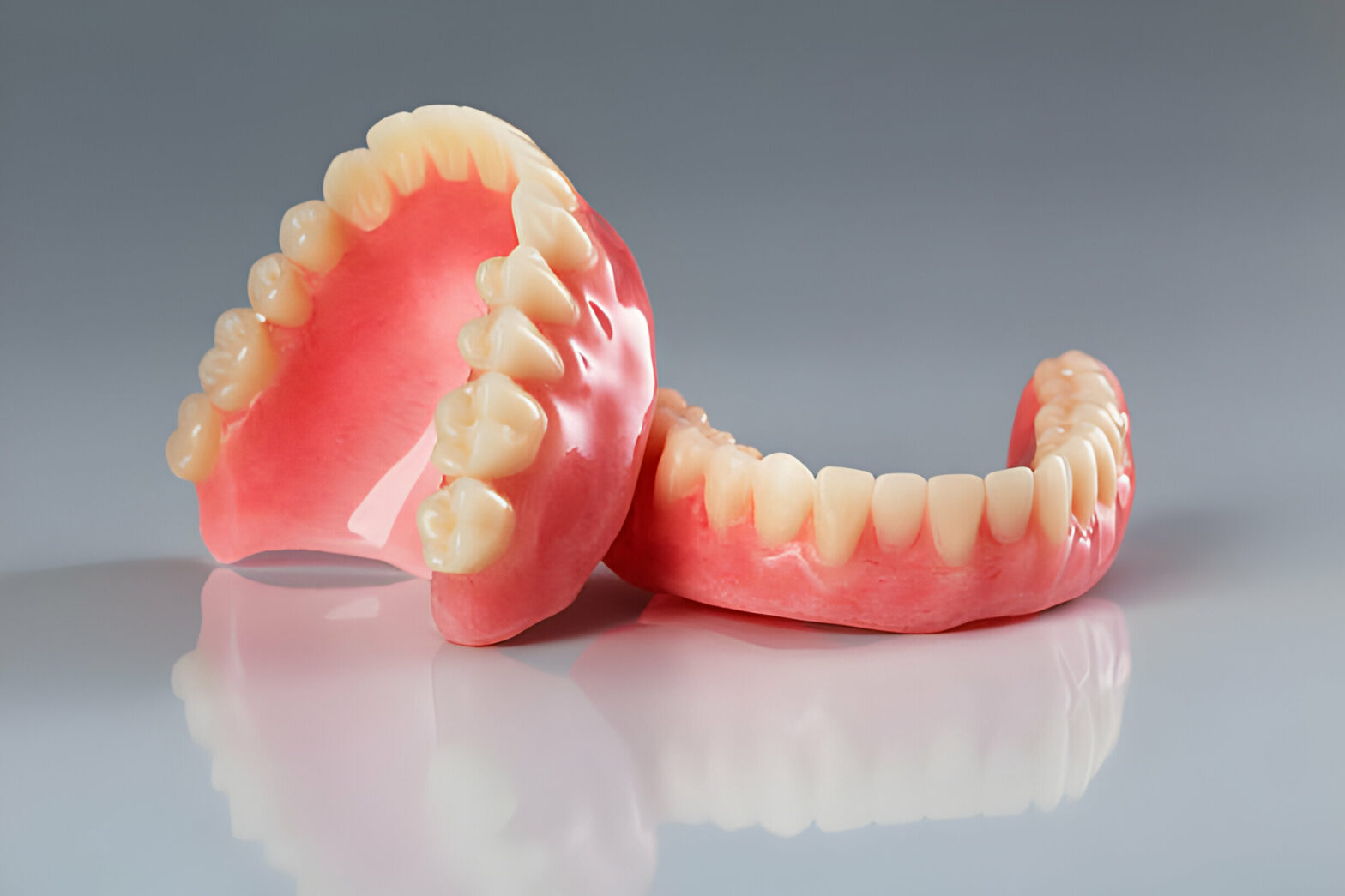Summary:
From smiling to chewing, dentures play a significant role in our lives! Interestingly, these prosthetics look and function like natural teeth and must be cared for similarly. Caring for your complete or partial dentures allows you to maintain your enhanced smile and oral health over time.

Sadly, however, many individuals do not know how to clean their appliances. Therefore, in this blog, we take a closer look at how to care for your dentures with topics like:
- Understanding Partials and Dentures
- Daily Cleaning Routine for Your Dentures
- Denture Do’s and Don’ts
- Everyday Oral Hygiene Tips for Your Dentures
- Dealing with Discomfort with Your Dentures
Continue reading as we learn more about the procedure in the following sections.
Understanding Partials and Dentures
Partials and dentures are prosthetic devices designed to replace lost or missing teeth and improve oral function. These appliances are available in various styles, including complete dentures for individuals with missing teeth.
Let’s learn more about these prosthetics in this section:
Partial Dentures:
Partial dentures are an excellent option for individuals who miss a few teeth or need implant-supported dentures for increased stability. These prostheses are custom-made to meet each patient’s specific dental demands, resulting in a pleasant, natural-looking solution.
Complete Dentures:
As the name suggests, complete dentures are prosthetics designed to replace all your missing teeth. They are created of porcelain or acrylic and held together using an acrylic base.
The advantages of wearing both appliances go beyond appearance! They increase chewing abilities, allowing people to eat various meals more effortlessly. Partials and dentures also help to strengthen face muscles, prevent drooping, and preserve facial structure.
Overall, wearing partials and dentures can improve your confidence and quality of life.
Importance of Proper Care for Your Dentures
Proper maintenance of partials and dentures ensures their efficacy and durability. Neglecting to clean and maintain these prostheses can result in gum disease, cavities, and pain.
Furthermore, poorly maintained prosthetics can affect speech and create awkwardness in social settings. Regular cleaning and care of your appliance are crucial to reducing plaque accumulation and bacterial development and preventing foul smell.

Patients who follow a daily care regimen and seek preventative maintenance can avoid common difficulties and keep their prosthetics in good shape.
But how do you clean your dentures? Let’s learn more about it in the following sections.
Daily Cleaning Routine for Your Dentures
Keeping your dentures clean is essential for your health and appearance! Plaque and germs love to linger around on dentures, just like they do on natural teeth.
But don’t worry! This daily regimen will keep your smile sparkling and your mouth happy:
- Brushing dentures: Use a soft-bristled denture brush and a non-abrasive cleaner twice a day (morning and night). Brush all surfaces gently, specifically the hard-to-reach areas around the gums. Consider giving your dentures a mini-massage.
- Using a denture cleaner: After brushing, place your dentures in a bubbly bath containing a denture-cleaning pill. These bubbly friends help remove stubborn stains and eliminate microorganisms. Soak for the amount of time advised on the packaging to get them clean.
- Rinsing and soaking overnight: When time is up, thoroughly clean your dentures with lukewarm water. Then, put them back in your mouth or keep them in a cold, dry area for the night. Remember to soak them in water or solution overnight to keep them hydrated and happy!
Tips to Handle & Store Your Dentures Effectively
Are you getting used to your new, bright smile? Like any other valued oral appliance, dentistry requires care and attention to give you a dazzling smile. But don’t worry, managing their care is easier than you think!
Let’s learn some quick tips for effectively handling and storing your denture:
- Proper technique for removal and insertion: Remember that dentures are sensitive. When taking them out, gently sway them back and forth before drawing them up. Pop them back similarly, carefully aligning them with your gums. Consider it a snug-fitting puzzle!
- Safe storage when not in use: Dentures require moisture even when not in use. Fill a bottle with lukewarm water or denture cleaning solution (read the directions carefully!). It prevents them from drying out and warping, resulting in your desired ideal fit.
- Avoiding damage and breakage: Treat your dentures like royalty! Choose a sturdy container with a cover to protect them from knocks and spills. Speaking of falls, avoid placing your appliance near the sink or opening windows to prevent accidents.
Denture Do’s and Don’ts
Consider your dentures the smiling superheroes, ready to take on any chewing challenge. But even great heroes must avoid some kryptonites!
Let’s look at some bad habits to ensure your dentures stay firm and your smile remains confident.
Chewing hard or sticky foods cautiously
While your dentures may appear strong, they are not impenetrable. Think twice before eating hard sweets, ice cubes, or gritty nuts. These can break or crack your dentures, so send them to Kelly Dental for repair. Choose softer meals, and your smile will thank you.
Using denture-friendly adhesives
Have your dentures ever gone on an unannounced vacation in the middle of a bite? Remember, it’s not cool!
Sticky foods like caramel or gum can loosen dentures, resulting in embarrassing slips and slides. However, if you love consuming these sweets, consider utilizing denture-friendly adhesives for more grip. Remember, a confident grin equals a joyful smile!
Steer clear of abrasive cleaning materials.
Think of your dentures as fragile gems, not kitchen surfaces! Scouring pads and bleach are harsh cleaning solutions that can scrape and harm the surface. Always use a soft-bristled toothbrush and cleansers explicitly designed for dentures.
Gently cleaning your dentures keeps them gleaming and retains their brilliance. Once you eliminate these detrimental practices, you can ensure your smile remains confident and vibrant.
Remember, your dentures are partners in your smile; treat them with adequate care!
Everyday Oral Hygiene Tips for Your Dentures
Brushing Twice a Day
Brushing is more than just getting rid of morning breath (although that is a perk!). The goal is to remove plaque, the sticky layer that contains cavity-causing bacteria. Always use a toothbrush with soft bristles and fluoridated toothpaste. Brush your teeth for two minutes twice a day.
Tongue Twisters and Beyond
Your tongue is more than a means of communication; it also serves as a hiding spot for bacteria. Invest in a soft tongue scraper and use it every morning and evening. This freshens your breath and keeps those pesky germs under control. Pay attention to the roof of your mouth (the palate)—a short swipe with your toothbrush will do wonders!
Dentist Dates
Do not skip out! Regular clinical visits for your dentures in Huntingburg. Consulting your dentist is more than cavity screenings. Regular checkups help you thoroughly clean your mouth, eliminating plaque and tartar effectively.
Dealing with Discomfort with Your Dentures
Getting used to brand-new dentures can be like learning a new language: thrilling but with some setbacks. Feeling discomfort while your mouth adapts to the new tee is normal. But don’t worry, this is only temporary!

Consider your new dentures like comfortable house shoes; they will require time to break in. Give yourself two to three weeks to become used to the feeling in your mouth. You may suffer discomfort, stiffness, or even slight speech abnormalities. It’s all part of the getting-to-know-you process!
Takeaway
- Partials and dentures are prosthetic devices designed to replace lost or missing teeth and improve oral function.
- Dentures, like any other valued oral appliance, require care and attention.
- Sticky foods, such as caramel or gum, can loosen dentures, resulting in embarrassing slips and slides of your appliance.
- Complete dentures are prosthetics designed to replace all of your missing teeth.
- Don’t let the dentures confuse you! Contact our experts at Kelly Family Dentistry to learn more about your smile.


